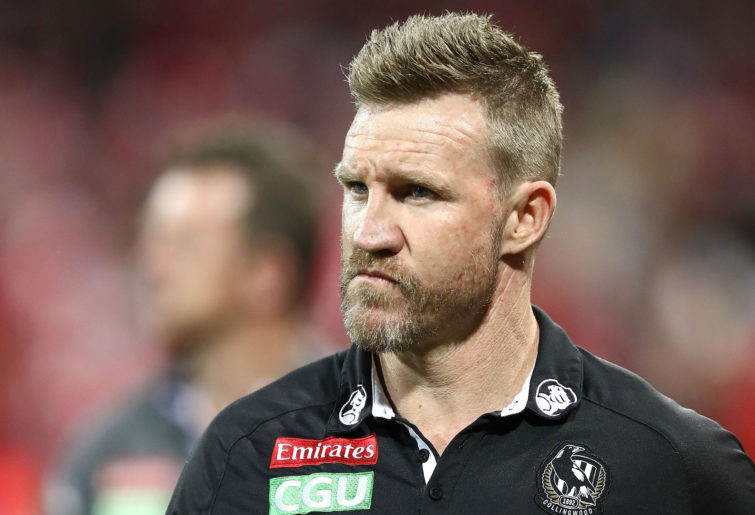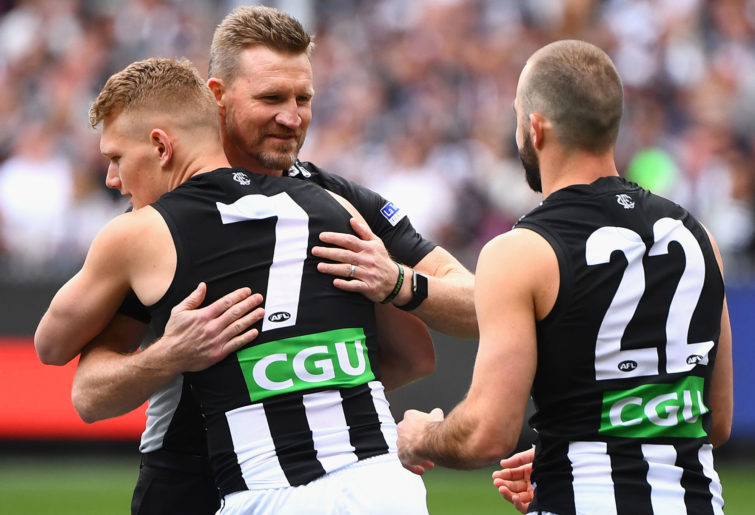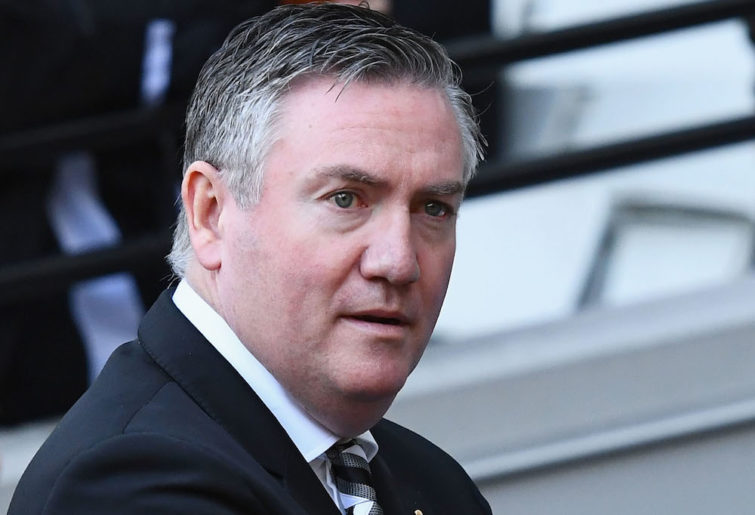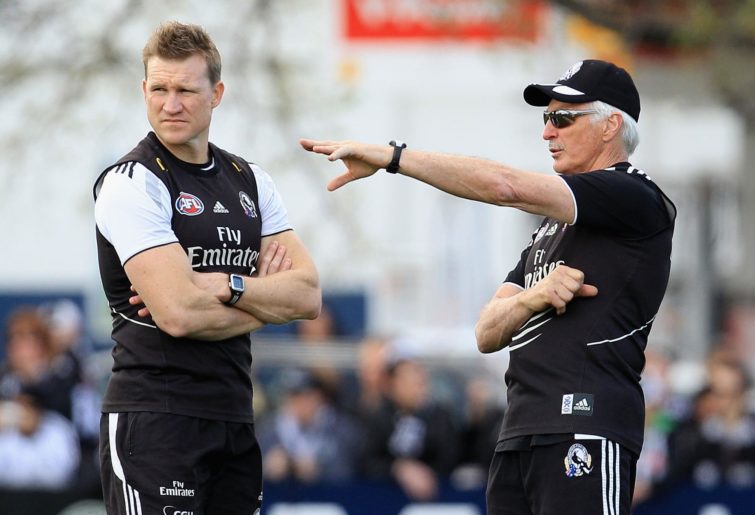Collingwood is broken.
I’m sure defenders of the club will point out the state of their finances, and the fact that they’re a socially conscious club are signs of good health.
Comparisons to lesser clubs might emerge to show that Collingwood is bigger and better than them, so why the complaints?
It’ll be the usual hyperbole.
Some of these things might be true, or contain truth.
But a football club is not ultimately about any of these things.
A football club is about winning flags.
That’s it.
Anybody who tells you differently shouldn’t be in a position where they might run a football club.
If you want the club to be about entrepreneurship or charities or multi-platforming, then the club should fold up its on-field operations and focus purely on those things.
The reality is that the club’s profile is what gives it the wherewithal to pursue those avenues.
But they should never detract from the focus.
First, foremost, and last, the club needs to be about winning flags.
And Collingwood has staggered about over the last ten years like they’re intent on self-harm and qualifying – repeatedly – for the Darwin Awards.
The first crippling blow was the succession plan. Many might be tired hearing about it. But it’s where the rot truly started.
I – as did many – originally wanted Nathan Buckley to coach. At the time that Buckley was anointed the successor in 2009, Malthouse looked spent.
And then Collingwood won a flag in 2010.
That should’ve been the end of the succession plan in any world.
Premierships – and coaches who can win them for Collingwood – aren’t so plentiful that the club can be cavalier about them.
But here, at the pinnacle of their dominance – the players united behind the coach who’d led them to a flag – Collingwood committed one of the worst crimes possible: they tried to fix what was not broken.
In fact, they tried to fix something that was working better than it had worked at Collingwood in over fifty years.

(Photo by Ryan Pierse/Getty Images)
Whether Malthouse guided Collingwood to further success after that is actually irrelevant.
The club should’ve let that era play out and end naturally, organically, before ushering in the next. Then there wouldn’t have been a divided playing list, cultural rejuvenation, forced rebuilds, a player exodus, and the litany of issues that followed.
Anything and everything they could’ve done would’ve been justified, rather than pre-emptive.
Since then, Collingwood have sputtered along. They’ve missed early draft picks. Their free agency acquisitions didn’t entrench themselves within the team. They overpaid for players such as Taylor Adams, Adam Treloar, and Will Hoskin-Elliott, seemingly trying to shore up the hole that had opened in the list.
And question marks formed and grew over the man they put in charge.
Nathan Buckley has surprised everybody as a coach. As a player, he was quick in action, purposeful and direct. As a coach, he has cultivated sides that are slow, defensive, and indirect. As a midfielder, Buckley had elite skills. As a coach, he’s built sides whose skills frequently let them down.
Queries have also opened up on his ability to manage different personalities, with regular scuttlebutt about personality clashes.
In 2018 he almost won a flag, but that’s hardly an accolade at Collingwood. A lot of coaches have almost won flags at Collingwood. If that’s what we’re celebrating as a highlight of any tenure, then the standard is definitely not where it needs to be at this club.
Since, they’ve gone backwards.
Somebody will certainly throw Covid out as a reason Collingwood’s 2020 imploded spectacularly.
It’s not a reason. It’s an excuse – another justification for the club to fail and tell themselves it was all too hard, but they should pat themselves on the back for the commendable effort, and things will be better next time around.
Look at Richmond. Richmond thrived.
Somebody will counter that we fared better than all those sides who finished outside the 8.
It’s an argument I make constantly: why is the standard not the premier? Why must aggrandisement only come from comparing down? Is this the only way they can feel big and important?
Now, coming out of trade week, they have hemorrhaged players. Most supporters I know are happy to make the hard calls to improve the list. It’s not about the trading itself, but Collingwood’s handling of personnel. Even if only a fraction of what’s reported in the media has been true, the handling has been abominable.
Adam Treloar, ironically, was Collingwood’s biggest marquee signing since Nathan Buckley in 1994. Yes, Collingwood have acquired other players, but nobody of this calibre.

Magpies head coach Nathan Buckley hugs Adam Treloar (Photo by Quinn Rooney/Getty Images)
The closest would be Anthony Rocca, but he was purely a prospect when he chose to leave Sydney and join his brother Saverio. Treloar was a young gun who came with a hefty price tag – two first rounders (two pick 7s).
Jaidyn Stephen is an exciting talent who exploded onto the scene in 2018 with such audacity and consistency that he won the Norwich Rising Star. His first half of 2019 was great until his betting suspension. He had a shocking 2020, struggling with glandular fever and hub life, but he’s not alone in that regard.
Now he’s gone for a fraction of his value.
Information is trickling out about his attitude, and whether he’ll realise his potential. Who knows if it’s truth or PR damage control? My response would be he’s a kid finding his way. There’s a guy at Richmond wearing number four who had a similar rocky path early. Imagine he’d been traded out.
Collingwood’s solution – not just now, but in the past – has been to jettison players who have become too difficult to handle: from Heath Shaw to Heritier Lumumba to Paul Seedsman to Jaidyn Stephenson.
I would’ve thought the onus was on the people in charge to find a way to connect, develop a relationship, and help players reach their fullest potential.
We’re not all the same.
Then there’s the salary cap queries. In his post-trade wrap up, Collingwood list manager Ned Guy claimed the salary cap pressure was a media beat up. Then why trade so frivolously? Tom Browne suggests it’s to prepare for free agency next year.
Wait. What?
So they traded out players cheaply to have salary cap room in twelve months’ time?
Sorry. Not buying that.
This trade period has felt like a salary cap dump and little else. Clubs Collingwood have dealt with haven’t had to offer market value because Collingwood’s held no leverage.
The salary cap surely must be an issue. The question is how Collingwood have messed it up so horribly.
Surely, whoever’s in charge – whether it’s the list manager, or a specialist brought in to deal with the finances – should map out the contracts over a rolling block of time (like five years), which would allow the club to know how much wiggle room they’d have for re-signings and acquisitions.
But, suddenly, it’s like Collingwood’s surprised that they’re bursting from their seams. This also comes immediately after landing Dayne Beams and re-signing Brodie Grundy to a seven-year contract. How did the powerbrokers not see this coming just two years ago?
Hilariously, in the Big Bash in 2014, Tim Paine queried how Melbourne Stars could fit their stellar personnel under the salary cap. Eddie McGuire, then president of the Stars, came out strongly – then again, when doesn’t he?

(Photo by Quinn Rooney/Getty Images)
At that time, McGuire said, “I take the upmost umbrage to this because I live very solidly over 15 years standing against any type of skulduggery in the salary cap in another form of life called the AFL.”
That was McGuire’s big defence. He ran a football club and they knew all about salary caps.
Oops.
While the list-build going into the 2010 flag was logical and beautiful to watch as it came to fruition, the list management since 2012 has been hodge-podge. The side often feels like an amalgam – like a State team: they’re wearing the same jumper for this week, but how well have they meshed?
The list management has focused on a plethora of mid-sized flankers, and almost been criminal in their neglect of key-positioners. Some might argue they just haven’t been available.
That’s not entirely true – there are names that Collingwood had access to in the draft. And, as other clubs have proven, you can trade. That’s been Collingwood solution, albeit for Moneyball options.
Now where does this list go? Is it contending? Is it rebuilding on the run? Is it long-term rebuilding? It’s hard to fathom because Collingwood never offer any genuine transparency about where they see themselves.
Often, I wonder if they know themselves.
Whatever their expectations, how that list now moves forward is anybody’s guess. I’m not a professional footballer, but the last fortnight has obliterated my morale. I don’t approach 2021 with optimism or hope.
How do the players feel? This might be a business, but successful teams involve unity, mateship, and camaraderie.
Collingwood just ran a scythe through those virtues.
Trades might be a part of every team sport, but usually players aren’t discarded while professing their love for the club and their intention to stay.
Fans have stuck with Collingwood through the succession plan, poor list management, an unsightly gameplan from 2014 – 2017 (and 2019 – 2020), a merry-go-round of directors of football (including the Graeme Allan debacle, that saw Neil Balme leave for Richmond), regular Eddie McGuire gaffes, a lottery of controversies, the constant injury malaise … and, well, it’s a big list.
A big, big list.
Probably bigger than you might realise.
Of course, every club has their problems.
But Collingwood seems to specialise in them.
And has done so over the last ten years.
Perhaps they – and all of us – were fooled by 2018. Here, we all believed, was the pay-off for the years of suffering.

Remember this situation? (Photo by Hamish Blair/Getty Images)
But, in typical Collingwood fashion, they fell tragically short.
Yet, even with the loss, here was something we believed we could build on.
Nope.
It’s been the worst mirage.
There’s no water at this oasis.
Since, they’ve inflicted the Dayne Beams deal on the club, fallen progressively on the ladder, have gushed players, had more McGuire gaffes and player controversies, and offered no genuine vision moving forward.
One of their traditional rivals, Richmond, has also skyrocketed past them.
What’s happened with Adam Treloar and Jaidyn Stephenson has wounded the faith of many among the Collingwood faithful.
Worse, it’s acted as recognition for the dissonance that’s grown over the last decade – the coalescence of missteps and stumbles and outright errors.
And it’s enraged them.
Check message forums and social media. Supporters are cancelling memberships and condemning the club. They are tired of the snowball that’s grown and is threatening to crush the club that an avalanche has just fallen upon.
The response will be the same. It just about always is – until it’s too late.
Stick with the us!
“Side by side!”
All that rhetoric and (italics)rah-rah-rah(/italics) passion.
Now let’s break out into the song and everything will be okay.
I’ve seen a handful of other supporters condemn what they label the “fair-weather” supporter for complaining, which – honestly – I find the height of idiocy and arrogance, and tantamount to bullying.
Which leaders do you follow unconditionally? Presidents of countries have fixed terms. Prime ministers regularly go to elections. Boards are answerable to their share-holders. Bosses are held accountable by their performance (if not a superior).
Every leader holds their position at the privilege of those they serve, and once that service comes into question, that privilege is then examined. If the service is deemed inadequate, they are dismissed for a better option – or at least a new option with fresh ideas.
The only exceptions are tyrannies.
Tyrannies expect unconditional support.
Tyrannies demand that you do not ask hard questions.
Tyrannies can do what they like without fear of repercussion.
Tyrannies shout down any opposition.
Tyrannies grow to rule in a myopia that loses all objectivity, only to ultimately crumble in disarray.
Well, here we are.
It’s not unpatriotic or “fair-weather” to ask questions.
It’s a duty.
A lot of supporters are disillusioned.
And the biggest question they have is whether the powers that be are still the right people to be leading the club.
In my opinion, the recent history suggests not.
































































































